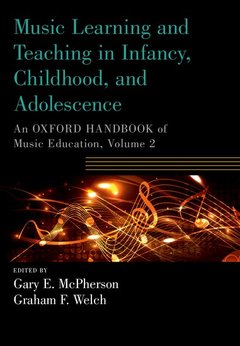Description
Music Learning and Teaching in Infancy, Childhood, and Adolescence
An Oxford Handbook of Music Education, Volume 2
Oxford Handbooks Series
Coordinators: McPherson Gary, Welch Graham
Language: English
Publication date: 06-2018
368 p. · 17.2x24.8 cm · Paperback
368 p. · 17.2x24.8 cm · Paperback
Description
/li>Biography
/li>
Music Learning and Teaching in Infancy, Childhood, and Adolescence is one of five paperback books derived from the foundational two-volume Oxford Handbook of Music Education. Designed for music teachers, students, and scholars of music education, as well as educational administrators and policy makers, the second book in this set explores a broad array of key issues, concepts, and debates related to music learning and teaching in three phases of a child's development. The first section provides an expanded view of infancy and early childhood, embracing a key theme that most young children's early music-making is improvised and used to communicate with others and the self. These chapters demonstrate the importance of "motherese" or "parentese" to young children's overall development, the extraordinary diversity and richness of children's early musical engagement, and how this can be viewed as a resource for further learning. The second section is devoted to the learning and teaching of music during the middle years of childhood, when music is often a mandated part of the school curriculum. While recognizing the enormous cultural and national differences, chapters in this section give an overview of many varied and innovative forms of musical learning and teaching globally. The authors address issues related to the types of teachers who provide music instructions to children internationally, how they were educated and trained, and how various nations organize their curriculum in ways that provide children with access and opportunities to engage with music in the classroom. The third section focuses on the musical experiences and development of adolescents aged 12 to 18. These chapters explore the role of music in the lives of young people-including how they use and relate to music, how music educators can best meet students' needs, and the types of musical engagement that can either empower or disempower students through involvement in school music. Contributors Mayumi Adachi, Randall Everett Allsup, Janet R. Barrett, Margaret S. Barrett, Brydie-Leigh Bartleet, Lily Chen-Hafteck, Richard Colwell, Sharon G. Davis, George M. DeGraffenreid, Steven C. Dillon, Magne I. Espeland, Martin Fautley, Eve Harwood, Lee Higgins, Beatriz Ilari, Neryl Jeanneret, Chee-Hoo Lum, Stephen Malloch, Esther Mang, Kathryn Marsh, Gary E. McPherson, Oscar Odena, Chris Philpott, S. Alex Ruthmann, Eric Shieh, Gary Spruce, Johannella Tafuri, Sandra E. Trehub, Colwyn Trevarthen, Kari K. Veblen, Graham F. Welch, Heidi Westerlund, Jackie Wiggins, Ruth Wright, Susan Young
Gary E. McPherson studied music education at the Sydney Conservatorium of Music, before completing a master of music education at Indiana University, a doctorate of philosophy at the University of Sydney, and a Licentiate and Fellowship in trumpet performance through Trinity College, London. He is the Ormond Professor and Director of the Melbourne Conservatorium of Music at the University of Melbourne, and has served as National President of the Australian Society for Music Education and President of the International Society for Music Education. His research interests are broad and his approach interdisciplinary. His most important research examines the acquisition and development of musical competence, and motivation to engage and participate in music from novice to expert levels. With a particular interest in the acquisition of visual, aural and creative performance skills he has attempted to understand more precisely how music students become sufficiently motivated and self-regulated. Graham F. Welch holds the University College London (UCL) Institute of Education Established Chair of Music Education. He is elected Chair of the internationally based Society for Education, Music and Psychology Research (SEMPRE), a former President of the International Society for Music Education (ISME), and past co-chair of the Research Commission of ISME. Current Visiting Professorships include the Universities of Queensland (Australia), Guildhall School of Music and Drama, and Liverpool (UK). He is an ex-member of the UK Arts and Humanities Research Council's (AHRC) Review College for music and has been a specialist consultant for Government departments and agencies in the UK, Italy, Sweden, USA, Ukraine, UAE, South Africa and Argentina. Publications number over three hundred and fifty and embrace musical development and music education, teacher education, the psychology of music, singing and voice science, and music in special education and disability.
© 2024 LAVOISIER S.A.S.




